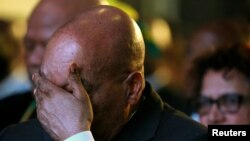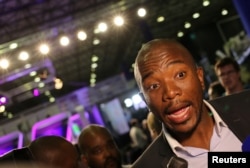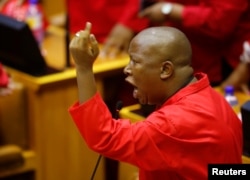South Africa faces a political dilemma after opposition parties finally loosened the African National Congress' iron grip on South African politics in last week's local government elections.
In 26 cities, including Johannesburg and Pretoria, the black-dominated ANC, the white-dominated Democratic Alliance, or DA, and the far-left Economic Freedom Fighters, or EFF, failed to win a majority.
That means the parties, which in the past have battered and bruised each other's images, have to find a way to cooperate.
So far, that isn't happening. DA leader Mmusi Maimane says his party needs coalition partners, but the ANC is not an option.
"We are clear that when we spoke about change, we meant we wouldn't work with the ANC,” Maimane said. “I will only work in any coalition that says firstly, can we deliver for the people? Is it a non-racial movement? Is it based on the rule of law? Will it create work for the people of that city? Will it ultimately make sure services are better and improved, and that there will be no corruption?"
EFF leader Julius Malema has also ruled out the ANC.
"We are not prepared to speak to the ANC or engage in any form of coalition with the ANC," he said.
The election results seem to put the EFF in the kingmaker's role in some areas. In Pretoria, for instance, the DA won 43 percent of the votes, the ANC won 41 percent, and the EFF took 12 percent. The EFF's share is enough to give either the DA or ANC the lead role in a majority coalition.
Given the history and the tension among the parties, independent analyst Piet Croucamp sees only a couple of workable combinations.
"The likeliness of a coalition, for instance, between the DA and the ANC is very, very small,” Croucamp said. “It's possible, but very, very small. It will always be most likely between say the ANC and very small parties, or the ANC and the EFF."
And given a choice, he says, the ANC and the DA will not consider a partnership with the EFF, whose leader, Malema, is known for fiery, controversial speeches.
"Both the ANC and the DA will not necessarily consider the EFF as a reliable partner because they have seen in the past that they could use destructive means of gaining political influence,” Croucamp said. “So both the ANC and the DA will do everything they can to avoid having a coalition with the EFF."
Parties have until August 20 to conclude negotiations, or run minority governments.
It's anyone's guess how the negotiations will turn out, but one thing is certain: A new kind of politics has begun in South Africa.






